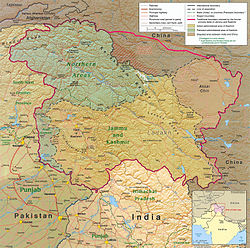United Kashmir People's National Party | |
|---|---|
 | |
| Abbreviation | UKPNP |
| Leader | Shaukat Ali Kashmiri [1] |
| General Secretary | Ishtiaq Hussain Khan [2] |
| Spokesperson | Nasir Aziz Khan [3] |
| Founded | April 10, 1985 |
| Ideology | Kashmiri nationalism Separatism Socialism |
| Party flag | |
 | |
| Website | |
| http://www.ukpnp.info | |
United Kashmir People's National Party (UKPNP) is a political party that advocates for an independent, united, and socialist Kashmir.

